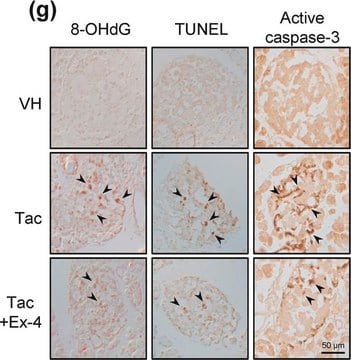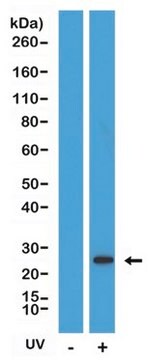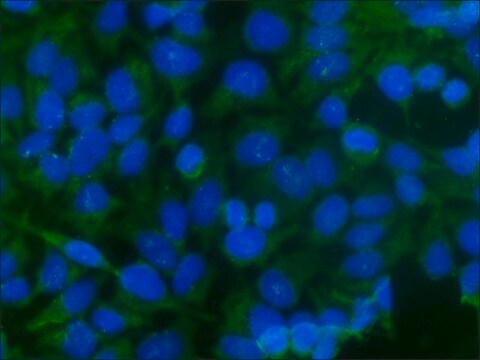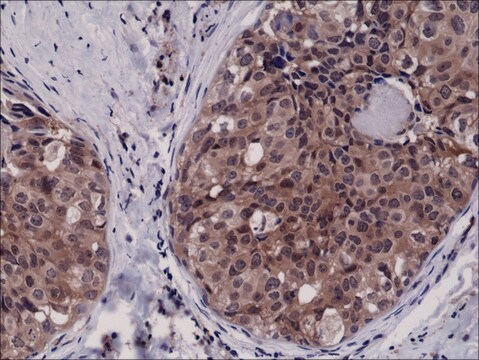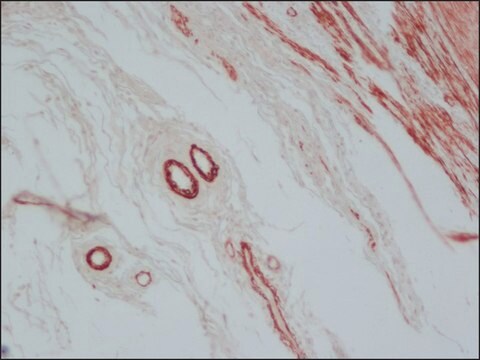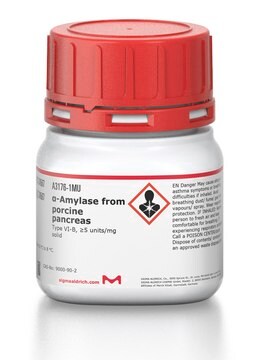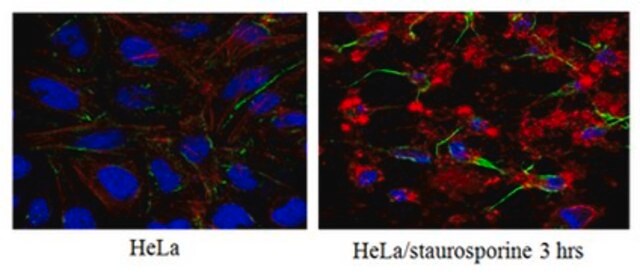C4733
BID, Caspase-8-cleaved from mouse
≥95% (SDS-PAGE), recombinant, expressed in E. coli, buffered aqueous solution
Anmeldenzur Ansicht organisationsspezifischer und vertraglich vereinbarter Preise
Alle Fotos(1)
About This Item
Empfohlene Produkte
Rekombinant
expressed in E. coli
Qualitätsniveau
Assay
≥95% (SDS-PAGE)
Form
buffered aqueous solution
UniProt-Hinterlegungsnummer
Versandbedingung
dry ice
Lagertemp.
−20°C
Angaben zum Gen
mouse ... Bid(12122)
Allgemeine Beschreibung
Mouse BID cleaved with caspase-8 generates the amino-terminal fragment (amino acids 1-59, 7 kDa) and the carboxy-terminal fragment (amino acids 60-195, 15 kDa). On size exclusion chromatography cleaved BID elutes at 27 kDa indicating that the fragments remain associated.
Biochem./physiol. Wirkung
Caspase-8-cleaved BID relocates from the cytosol to the outer mitochondrial membrane where its interaction with Bak alters mitochondrial membrane permeability.
Physikalische Form
0.2 μm filtered solution in 25 mM HEPES, pH 7.5, and 0.1 M KCl.
Hinweis zur Analyse
Measured by its ability to induce cytochrome c release from isolated mouse liver mitochondria.
Lagerklassenschlüssel
10 - Combustible liquids
WGK
nwg
Flammpunkt (°F)
Not applicable
Flammpunkt (°C)
Not applicable
Hier finden Sie alle aktuellen Versionen:
Analysenzertifikate (COA)
Lot/Batch Number
Die passende Version wird nicht angezeigt?
Wenn Sie eine bestimmte Version benötigen, können Sie anhand der Lot- oder Chargennummer nach einem spezifischen Zertifikat suchen.
Besitzen Sie dieses Produkt bereits?
In der Dokumentenbibliothek finden Sie die Dokumentation zu den Produkten, die Sie kürzlich erworben haben.
M C Wei et al.
Genes & development, 14(16), 2060-2071 (2000-08-19)
TNFR1/Fas engagement results in the cleavage of cytosolic BID to truncated tBID, which translocates to mitochondria. Immunodepletion and gene disruption indicate BID is required for cytochrome c release. Surprisingly, the three-dimensional structure of this BH3 domain-only molecule revealed two hydrophobic
J Zha et al.
Science (New York, N.Y.), 290(5497), 1761-1765 (2000-12-02)
Many apoptotic molecules relocate subcellularly in cells undergoing apoptosis. The pro-apoptotic protein BID underwent posttranslational (rather than classic cotranslational) N-myristoylation when cleavage by caspase 8 caused exposure of a glycine residue. N-myristoylation enabled the targeting of a complex of p7
X Luo et al.
Cell, 94(4), 481-490 (1998-09-04)
We report here the purification of a cytosolic protein that induces cytochrome c release from mitochondria in response to caspase-8, the apical caspase activated by cell surface death receptors such as Fas and TNF. Peptide mass fingerprinting identified this protein
H Li et al.
Cell, 94(4), 491-501 (1998-09-04)
We report here that BID, a BH3 domain-containing proapoptotic Bcl2 family member, is a specific proximal substrate of Casp8 in the Fas apoptotic signaling pathway. While full-length BID is localized in cytosol, truncated BID (tBID) translocates to mitochondria and thus
BCL-2 family members and the mitochondria in apoptosis.
A Gross et al.
Genes & development, 13(15), 1899-1911 (1999-08-13)
Unser Team von Wissenschaftlern verfügt über Erfahrung in allen Forschungsbereichen einschließlich Life Science, Materialwissenschaften, chemischer Synthese, Chromatographie, Analytik und vielen mehr..
Setzen Sie sich mit dem technischen Dienst in Verbindung.